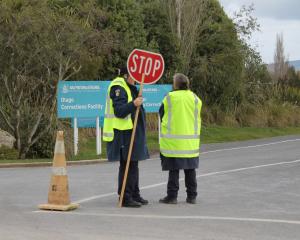Susan Roberts knows just how important it is to buckle up in a vehicle.
In 2013, the Dunedin woman and her daughters were twice, within three months, saved from serious injury by their seatbelts.
''The first I was going through an intersection and a guy ran a red light. I managed to get my brakes on enough so that in the end I just T-boned him,'' she said.
She ended up with shoulder bruising. Her daughter, then aged 13, sitting in the front seat, received tears to her abdomen and her other daughter, then 7, sitting in the back seat, received seatbelt bruising.
In the second accident, Miss Roberts was driving with her youngest daughter when forced to slow down because ducks were crossing the road. Another driver rear-ended her vehicle, causing $8000 worth of damage. The worst of their injuries was seatbelt bruising.
''I'd imagine that [without seatbelts on] both of my daughters probably would've gone through the windscreen and I probably would've had quite severe injuries from the steering wheel. Seatbelts are definitely life-savers.''
Miss Roberts' warning comes as police launch a seatbelt campaign in the city this month.
Last year, Southern district police issued 5322 infringement notices to people not wearing seatbelts, the highest number since 2010. In the same year, seven people not wearing seatbelts were killed on the roads.
''It's disappointing that so many people don't take the easiest measure to help prevent injury and death on our roads by wearing their safety belt,'' Southern district road policing manager, Acting Inspector Tania Baron said.
Miss Roberts said wearing seatbelts was something she had always made sure she and her children did.
''It's a must. If you're in an accident it saves your life. The force I felt in those accidents was horrendous. It was like you were getting thrown forward on a rollercoaster - the worst thing was I could see it coming but there was nothing I could do,'' she said.
St John and Otago Regional Rescue Helicopter intensive care paramedic Andrew Duncan said he had attended accidents in which people not wearing seatbelts had been critically injured.
''I've been to accidents where, in hindsight, I've thought a seatbelt has saved this person from worse injuries - it's made a big difference.
''It's difficult to quantify how effective they are. I don't have those figures, but from what I've seen, I will always wear a seatbelt,'' Mr Duncan said.
People not wearing seatbelts had been thrown out of cars, which caused horrific injuries, he said.
''It's an easy safety device to utilise - it doesn't take long to do it up. I know with my children the first thing they do is get in and put seatbelts on automatically. They get very uncomfortable if you start moving before they have it on.''
Insp Baron said southern police would be targeting drivers and passengers not wearing their seatbelts this month, and those found to be non-compliant would face a fine of $150.
''Our young ones are aware of the rules, but they learn by example - be a role model and take that extra couple of seconds to make sure we are as safe as we can be,'' she said.
- by David Beck












